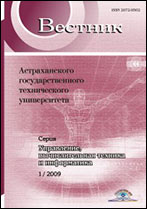|
This article is cited in 1 scientific paper (total in 1 paper)
TELECOMMUNICATION SYSTEMS AND NETWORK TECHNOLOGIES
Algorithm for determining frequency of a harmonic signal using stochastic sampling
I. N. Zaitsevaa, V. N. Ugol'kovb
a Yelets State Ivan Bunin University
b LLC «Inzhenernaya kompaniya»
Abstract:
The paper deals with the development of an algorithm for determining frequency
of harmonic signals using a probabilistic-statistical method. The main feature of this algorithm is
a short time of addressing to the investigated signal, which much shorter than signal period, according to three integrated sample collections with digital processing. Instantaneous values of the investigated signal in each sampling are based on stochastic discretization over time, according to the uniform distribution law. The main advantages of the algorithm are the short time of access to the signal under study and high accuracy of frequency measurement, which is essential for the infralow frequency signals with a duration period measured in minutes, hours, days, etc. There has been performed a numerical experiment in order to evaluate an error in determining frequency of such signals, depending on the accuracy of their sampling by real analog-to-digital converters. The paper shows that the error of frequency determined by the developed algorithm makes a few hundredths of a percent and scarcely depends on accuracy of a signal discretization by a certain level. The error obtained corresponds to discretization accuracy under conversion into accepted values of analogue-to-digital converters from 6- to 16-bit analogue-to-digital converters. The present algorithm may find practical use in radio technical processing of infralow frequency signals in acoustics, hydro-acoustics, seismic acoustics, underwater and underground communication.
Keywords:
signals, digital processing, parameters, frequency, shorter than the period access time, stochastic sampling.
Received: 30.08.2017
Citation:
I. N. Zaitseva, V. N. Ugol'kov, “Algorithm for determining frequency of a harmonic signal using stochastic sampling”, Vestn. Astrakhan State Technical Univ. Ser. Management, Computer Sciences and Informatics, 2017, no. 4, 54–59
Linking options:
https://www.mathnet.ru/eng/vagtu506 https://www.mathnet.ru/eng/vagtu/y2017/i4/p54
|

| Statistics & downloads: |
| Abstract page: | 192 | | Full-text PDF : | 43 | | References: | 29 |
|




 Contact us:
Contact us: Terms of Use
Terms of Use
 Registration to the website
Registration to the website Logotypes
Logotypes








 Citation in format
Citation in format 
